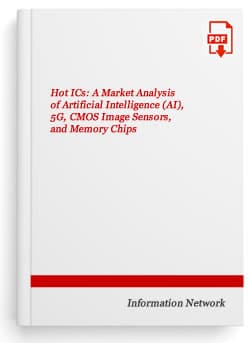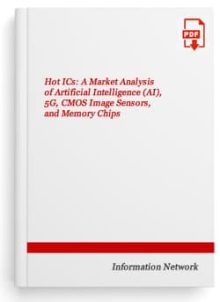Description
This report examines in detail Artificial Intelligence (AI), 5G, CMOS Image Sensor, and Memory Chips (DRAM, NAND, NVM). Markets for the ICs and their applications are forecast to 2025, and market shares given in each sector. A profile of the IC manufacturers for each sector is presented.
Not only are these ICs the “hottest” part of the highest growing technology sectors, they are, in fact, interrelated.
Advanced driver-assistance systems (ADAS) are ubiquitous in autonomous vehicles. ADAS uses CMOS Integrated Sensors, memory, processing, and networking to detect road conditions and provide feedback to drivers-and in some cases to drive the vehicle off the road if there are unsafe conditions.
Besides powering ADAS and autonomous vehicles, AI is also a key enabler of voice recognition technologies, smart cities, and the Internet of Things (IoT). AI alongside the development of greater universal connectivity will enable new services that can benefit consumers in many ways.
Real-world fleets of autonomous vehicles are now ready for commercial deployment and many auto companies already provide some level of autonomous vehicle technology in their latest models. It is likely that on the show floor and in conference presentations we will see new uses for these AI-driven vehicles. We’ll also see how possible problems are being tackled before the technology moves more into the consumer space.
The growth in mobile and personal devices, and their need for energy-efficient electronics, will lead to new ways to store information for immediate processing as well as long-term storage. The report details storage and memory products including those using traditional (NAND and DRAM) memories and emerging memories, such as phase change memory (PCM), magnetic random access memory (MRAM) or resistive random access memory. With the end of Moore’s-law computer-lithography scaling, there is also a move to more specialized processing capability, tied to particular applications.
1.0. Executive Summary
2.0. CMOS Image Sensors (CIS)
2.1. CMOS Sensors Technology and Trends
2.2. Applications
2.2.1. Automotive/Advanced Driver Assistance Systems (ADAS)
2.2.2. Smartphones
2.2.3. Others
2.3. Market Analysis
2.3.1. Introduction
2.3.2. Automotive
2.3.3. Smartphones
2.3.4. Others
2.4. CMOS Image Sensor Supplier Products and Profiles
Canon
Galaxycore
Hanamatsu
LG Electronics
Newsight Imaging
ON Semiconductor
Omnivision
Pixelplus
Samsung Electronics
SK Hynix
Sharp
Sony
TowerJazz Panasonic
3.0. 5G
3.1. 5G Chip Technology and Trends
3.2. Applications
3.2.1. Mobile Handsets
3.2.2. Interdisciplinary Connections
3.3. Market Analysis
3.3.1. Market Forecasts
3.3.2. New Components For 5G vs 4G
3.3.2.1 5G Modem Chip Overview
3.3.3.2 5G Chip
3.3.2.3 mmWave Modules
3.3.2.4 Traditional MIMO Antennas
3.3.3. China Mobile Carriers
3.3.4. Japan Mobile Carriers
3.3.5. U.S. Mobile Carriers
3.4. 5G Chip Supplier Products and Profiles
Analog Devices
Anokiware
Apple
Broadcom
Huawei
Infineon
Intel
Inphi
Microchip
MediaTek
Marvell
M/A-Com
NXP Semiconductor
On Semiconductor
Qualcomm
Qorvo
Samsung Electronics
Sivers IMA
Skyworks Solutions
STMicroelectronics
Teradyne
Texas Instruments
Win Semiconductors
Xilinx
4.0. Artificial Intelligence (AI)
4.1. AI Technology and Trends
4.1.1. Cloud AI Computing
4.1.2. Edge AI Computing
4.2. Applications
4.2.1. Industry Applications of AI
4.2.1.1 Smart Healthcare
4.2.1.2 Smart Security
4.2.1.3 Smart Finance
4.2.1.4 Smart Grid
4.2.1.5 Smart Hone
4.2.2. AI-Powered Devices
4.2.2.1 Smart Speakers
4.2.1.2 Drones
4.2.1.3 Intelligent Robots
4.3. Market Analysis
4.3.1. Introduction
4.3.2. China’s AI Plan
4.3.2.1 Driverless Vehicles
4.3.2.2 Computer Chips
4.3.2.3 Financial
4.3.2.4 Facial Recognition
4.3.2.5 Retail
4.3.2.6 Robots
4.3.3. AI Chip Revenue Forecast
4.4. AI Chip Technology
4.4.1. Graphics Processing Unit (GPU)
4.4.2. Field Programmable Gate Array (FPGA)
4.4.3. Application Specific Integrated Circuits (ASIC)
4.4.4. Neuromorphic Chips
4.5. AI Chip Supplier Products and Profiles
4.5.1. IC Vendors
AMD
HiSilicon
IBM
Intel
MediaTek
Nvidia
NXP
Qualcomm
Rockchip
Samsung Electronics
STMicroelectronics
Xilinx
4.5.2. Cloud Providers – Tech Leaders
Alibaba
Alibaba Cloud
Amazon
Apple
Baidu
Fujitsu
Huawei Cloud
Microsoft
Nokia
Tencent Cloud
Tesla
4.5.3. IP Vendors
ARM
CEVA
Imagination
VeriSilicon
Videantis
4.5.4. Startups Worldwide
Adapteva
aiCTX
AImotive
AlphaICs
BrainChip
Cerebras Systems
Cornami
DeepScale
Esperanto Technologies
Graphcore
GreenWaves Technology
KAIST
Kalray
Kneron
Knowm
Koniku
Mythic
SambaNova Systems
Videantis
Wave Computing
4.5.5. Startups in China
AISpeech
Bitmain
Cambricon
Chipintelli
DeePhi Tech
Horizon Robotics
NextVPU
Rokid
Thinkforce
Unisound
5.0. Memory Chips
5.1. Memory Technology and Trends
5.1.1. DRAM
5.1.2. NAND
5.1.3. NVRAM – MRAM, RRAM, and FERAM
5.2. Applications
5.2.1. DRAM
5.2.1.1 Server
5.2.1.2 PC
5.2.1.3 Graphics
5.2.1.4 Mobile
5.2.1.5 Consumer
5.2.2. NAND
5.2.2.1 SSD
5.2.2.2 PC
5.2.2.3 TV
5.2.2.4 Mobile
5.2.2.5 USB
5.3. Market Analysis
5.4. Memory Chip Supplier Products and Profiles
CXMT
Fujian
GigaDevice Semiconductor
Intel
Micron Technology
Nanya
Powerchip Technology
Samsung Electronics
SK Hynix
Toshiba (Kloxia)
Tsinghua Chongqing
Western Digital
Winbond
YMTC
LIST OF FIGURES
2.1. Five Levels of Autonomous Driving
2.2. Average Semiconductor Content Per Car by Level of Automation
2.3.. Automotive Imaging Segments
2.4. Market Shares of CMOS Image Sensor Manufacturers
2.5. Semiconductor Market Forecast for ADAS
2.6. IC Content Used in ADAS Systems – 2015
2.7. Market Shares of Automotive CMOS Image Sensor Manufacturers
2.8. CMOS Image Sensor Market Forecast For Smartphones
2.9. CMOS Image Sensor Market Forecast For Other Applications
3.1. RF Chip Market Forecast by Network Generation
4.1. Performance Comparison of TPU, GPU, and CUP
4.2. AI Training and Inference
4.3. AI Training and Inference Chip Forecast – Revenue
4.4. AI Training and Inference Chip Forecast by Type – Units
5.1. DRAM Scaling
5.2. DRAM Memory Shrink Roadmap
5.3. Quadruple Patterning Technology
5.4. Ultra-Thin Dielectric Layer Deposition
5.5. Proprietary Circuit Design Technology
5.6. 3D-NAND Memory Shrink Roadmap
5.7. 3D-NAND Generation by Manufacturer
5.8. Transition from SLC to QLC NAND
5.9. Comparison Of Non-Volatile Ram Write Times
5.10. Competition In Dissipation Speed And Memory Capacity
5.11. Comparison Of Non-Volatile RAM Technology
5.12. Total Available Market for SST MRAM
5.13. Total Available Market for Toggle MRAM
LIST OF TABLES
2.1. Levels of Autonomous Driving
2.2. Market Forecast of CMOS Image Sensors by Application
2.3. Aotomotive Image Sensor Market by Application
2.4. Forecast of ADAS Market by Systems
3.1. Feature Comparison of Smartphone Power Amplifiers by Generations
3.2. Smartphone Subscription Forecast by Geographic Region
3.3. Smartphone Subscription Forecast by Technology
3.4. 5G Smartphone Subscription Forecast by Geographic Region
3.5. 5G Smartphone Plans by Geographic Region
3.6. 5G Smartphone Mobile Semiconductor Forecast
3.7. 5G Semiconductor Total Available Market Forecast. 3.
3.8. 5G Smartphone Shipment By Major OEMs
3.9. 5G Smartphone Shipment By Country
3.10. Incremental Cost For 5G Phone Vs 4G
3.11. Top Wireless Carriers
4.1. Smart Speaker Products
4.2. AI Training and Inference Chip Forecast
4.3. AI Chip Forecast by Chip Type
4.4. Characteristics of CPU, FPGA, CPU, and ASIC
4.5. Characteristics of CPU, FPGA, CPU, and ASIC
5.1. DRAM Bit Growth Supply Forecast by Company
5.2. DRAM Bit Growth Demand Forecast by Application
5.3. DRAM Wafer Capacity Forecast by Fab – Wafers
5.4. DRAM Market Shares
5.5. DRAM Capex Forecast by Company
5.6. NAND Bit Growth Supply Forecast by Company
5.7. NAND Bit Growth Demand Forecast by Application
5.8. NAND Wafer Capacity by Company Fab
5.9. 3D NAND Wafer Capacity Forecast by Fab
5.10. NAND Capex Forecast by Company
5.11. DRAM Content of Chinese Smartphones
5.12. NAND Content of Chinese Smartphones

